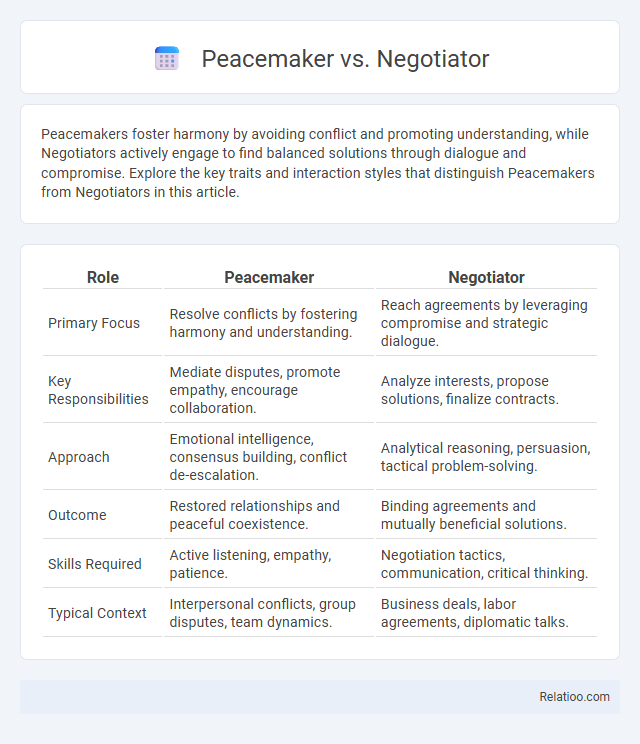Peacemakers foster harmony by avoiding conflict and promoting understanding, while Negotiators actively engage to find balanced solutions through dialogue and compromise. Explore the key traits and interaction styles that distinguish Peacemakers from Negotiators in this article.
Table of Comparison
| Role | Peacemaker | Negotiator |
|---|---|---|
| Primary Focus | Resolve conflicts by fostering harmony and understanding. | Reach agreements by leveraging compromise and strategic dialogue. |
| Key Responsibilities | Mediate disputes, promote empathy, encourage collaboration. | Analyze interests, propose solutions, finalize contracts. |
| Approach | Emotional intelligence, consensus building, conflict de-escalation. | Analytical reasoning, persuasion, tactical problem-solving. |
| Outcome | Restored relationships and peaceful coexistence. | Binding agreements and mutually beneficial solutions. |
| Skills Required | Active listening, empathy, patience. | Negotiation tactics, communication, critical thinking. |
| Typical Context | Interpersonal conflicts, group disputes, team dynamics. | Business deals, labor agreements, diplomatic talks. |
Defining the Roles: Peacemaker and Negotiator
Peacemakers specialize in resolving conflicts by fostering empathy and understanding, prioritizing harmony and long-term relationship building. Negotiators focus on reaching mutually beneficial agreements through effective communication, strategic compromise, and problem-solving tactics. Both roles require strong interpersonal skills, but peacemakers emphasize emotional connection while negotiators prioritize practical outcomes.
Core Skills: Peacemaking vs Negotiation
Peacemaking centers on conflict resolution through empathy, active listening, and emotional intelligence, enabling you to foster harmony and mutual understanding. Negotiation emphasizes strategic communication, persuasion, and compromise to achieve agreements that balance interests and objectives. Developing core skills in peacemaking nurtures relationships and reduces tension, while negotiation skills drive concrete outcomes in business or personal disputes.
Approaches to Conflict Resolution
Peacemaker, Negotiator, and Mediator each adopt distinct approaches to conflict resolution. Peacemakers prioritize harmony and seek to soothe tensions by fostering understanding and empathy among parties. Negotiators focus on reaching mutually beneficial agreements through strategic communication and compromise, while Mediators facilitate dialogue without imposing solutions, helping Your parties explore options and find common ground.
Emotional Intelligence in Peacemaking and Negotiation
Emotional intelligence plays a crucial role in distinguishing Peacemakers, Negotiators, and Mediators, as it enables them to effectively manage emotions, build empathy, and foster trust during conflict resolution. Peacemakers typically excel in creating harmonious environments by recognizing and addressing underlying emotional needs, while Negotiators leverage emotional awareness to influence outcomes and achieve mutual agreements. Mediators combine these skills, utilizing emotional intelligence to facilitate dialogue and bridge differences between opposing parties, ensuring constructive communication and collaborative problem-solving.
Communication Styles: Peacemaker vs Negotiator
Peacemakers prioritize harmony and avoid conflict by using empathetic, calm, and patient communication styles that seek consensus and understanding. Negotiators employ strategic, assertive, and persuasive communication techniques focused on finding mutually beneficial agreements through direct dialogue and problem-solving. While Peacemakers emphasize emotional connection and stability, Negotiators focus on clarity, compromise, and leveraging positions to achieve tangible outcomes.
Influence and Persuasion Techniques
Peacemaker excels in empathy-driven influence, using active listening and emotional validation to build trust and reduce conflict. Negotiator leverages strategic communication and problem-solving skills, employing logical reasoning and compromise to reach mutually beneficial agreements. Peacemaker emphasizes harmony through collaboration and understanding, while Negotiator prioritizes goal-oriented persuasion by balancing assertiveness with tact.
Real-World Examples: Success Stories
Peacemaker and Negotiator roles often intersect in conflict resolution scenarios, yet their approaches yield distinct success stories. In the United States' Camp David Accords, Peacemakers facilitated trust and empathy between Israel and Egypt, leading to a lasting peace treaty. Conversely, Negotiators played a critical role during the Iran nuclear deal by leveraging strategic dialogue and compromise to achieve a diplomatic agreement.
Situational Advantages and Limitations
Peacemaker excels in reducing conflicts by fostering harmony and understanding but may struggle in high-pressure situations requiring swift decision-making. Negotiator thrives in dynamic scenarios involving compromise and strategic communication but can be less effective when emotional intelligence is paramount. Peacemaker's advantage lies in long-term relationship building, whereas Negotiator's strength is immediate conflict resolution, each constrained by their respective contexts and objectives.
Choosing the Right Approach: When to Mediate or Negotiate
Choosing the right approach between peacemaker, negotiator, and mediator depends on the conflict context and desired outcomes. Peacemakers focus on restoring harmony by addressing emotional tensions, while negotiators prioritize reaching mutually beneficial agreements through bargaining techniques. Mediators serve as neutral facilitators who guide parties toward resolution, making mediation ideal when direct negotiation is stalled or emotional barriers prevent constructive dialogue.
Integrating Peacemaking and Negotiation Skills
Integrating peacemaking and negotiation skills enhances conflict resolution by combining the empathetic approach of a Peacemaker with the strategic tactics of a Negotiator. Peacemakers prioritize harmony and understanding, fostering trust and emotional connection, while Negotiators employ problem-solving techniques and leverage interests to reach mutually beneficial agreements. Mastery of both skill sets enables individuals to manage disputes effectively, balancing emotional intelligence with practical negotiation frameworks to achieve sustainable peace.

Infographic: Peacemaker vs Negotiator
 relatioo.com
relatioo.com